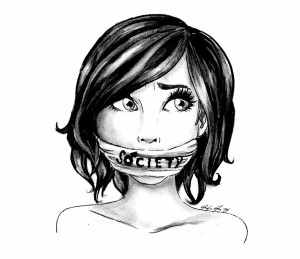More needed to end campus sexual assault
“Boys will be boys!”
It’s a seemingly harmless expression that calls to mind images of laughing parents dismissing their sons’ horseplay. Within the context of the ongoing issue of sexual assault on campus, however, this phrase gains eerie new significance. Boys will be boys — in other words, it is in their nature to take what or whomever they want, so women have to protect themselves.
Worded that way, it all sounds incredibly primal, but this mindset is more prevalent than one might think. Worse still, its effects are directly impacting students at USC.
On July 9, a survey prepared by the Senate Subcommittee on Financial and Contracting Oversight at the request of Chairman Claire McCaskill (D-Missouri) went public. The results of this survey revealed that many U.S. institutions fall short of meeting legal standards for handling on-campus sexual violence. Fifty-five universities are currently under federal investigation. USC is one of the four located in California.
This might come as a shock to the typical USC student, considering the various campus resources available to sexual assault victims. After all, on-campus support appears to be better than ever; a Google search of “USC sexual assault” leads directly to the comprehensive USC Sexual Assault Resource Center website. The SARC website provides links on the victim’s reporting rights, on- and off-campus resources and more. The SARC is housed within the Center for Women and Men, a division of USC Student Affairs that works to provide support and confidential counseling to victims of any violence or harassment related to gender. Its agenda includes MenCARE, a program that provides training for men and studies on how male students respond to and perceive sexual assault. Yet, despite efforts to combat sexual violence, USC has hit several stumbling blocks.
Central to this issue is the problematic “rape culture” in which we live. According to USC Marriage and Family Therapy Program Lead Dr. Ginger Clark, rape culture is a term used by many women’s rights groups to “describe a set of beliefs and behaviors that make rape an acceptable condition of living.”
“The first and most powerful of those beliefs is that women do not have the right to be openly sexual beings,” Clark said via email. “They are not seen as independent people who own the rights to their bodies.”
It is this archaic misconception, among many consequent factors, that fuels the prevalence of sexual violence in society at large and at USC. “Rape culture” operates on double standards. If a woman withholds sex, she is frigid or prudish. If a woman embraces her sexuality, she is a “slut.” Essentially, the odds are stacked against female sexuality no matter what, and the catch-22 doesn’t end there. Prudes and sluts aside, it seems that no woman is more condemned than she who “friend-zones” good-hearted suitors.
Clark provides a powerful counterargument to those who complain about women having “all the choice” when it comes to their own sexuality.
“When a man is not attracted to a woman, there is not the same level of outrage to his withholding of attention or sexual intercourse,” she wrote. “But in ‘rape culture’ when a woman is not attracted to a man and chooses not to be with him, it is seen as her abusing her power … as if sex were the customary and socially expected response.”
Clearly, this is a socially ingrained behavior, and reversing this mindset will not be easy. Still, there is a solution.
Instead of teaching women to prevent their own sexual assault, Clark suggests targeting the assailant and increasing accountability among men and bystanders alike.
“[Men] are thinking, feeling, intelligent people … who are able to examine their own thinking and behavior, but we have not treated them this way,” Clark insists. “We have assumed they cannot change. I believe this is a mistake, and deeply disrespectful to both men and women.”
Instead of buying into this flawed, two-dimensional logic, it is the responsibility of all Trojans and all human beings to respect one another. USC students are fortunate enough to have the resources available to make a difference, both on campus and in the world at large; it is in their power to promote programs like MenCARE in advocating the role of men in preventing sexual violence. Moreover, speaking up and encouraging male friends to respect women and their right to consent goes a lot farther than one might think. Trojans might not be able to immediately halt global sexual violence, but it is well within their power to put an end to this epidemic on-campus. To quote Clark once more, “Trojans can be the trailblazers to help eradicate rape culture everywhere.”



A lot of people have been working on this for a long time. A big shout out to the womens’ student assembly, those brave survivors of rape and sexual assault from USC who have come forward to tell their story, and the allies who have stood in solidarity. USC needs to do more. A lot more. And the damaging culture on Frat Row, but also in classrooms, small dorms and whispered conversations in libraries, need to take on the underlying causes of these horrors: the lack of real equality, and equality of respect, between men and women. It should start with this generation. Now.